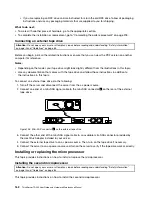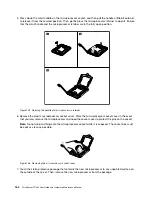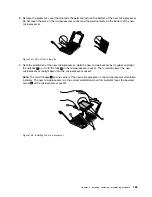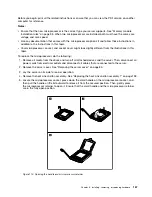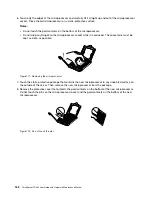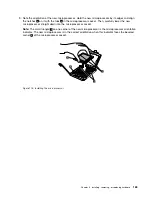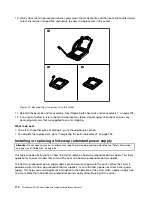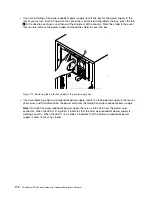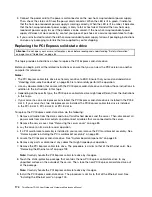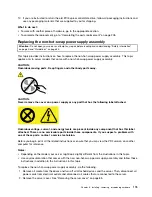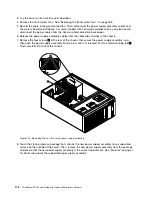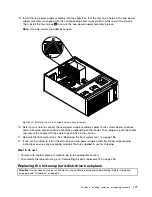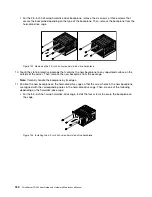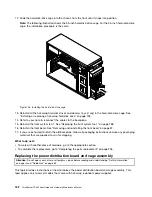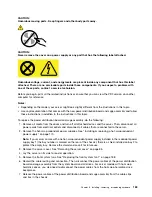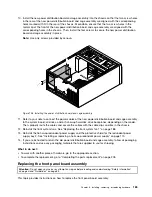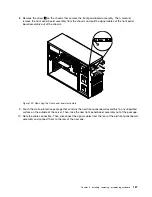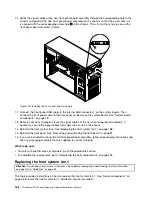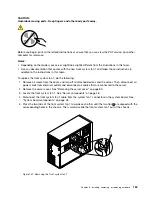
5. Connect the power cord to the power cord connector on the new hot-swap redundant power supply.
Then, check the status LED near the power cord connector. When the LED is lit in green, it indicates
that the hot-swap redundant power supply is working correctly. When the LED is lit in amber, it indicates
that the hot-swap redundant power supply is likely to fail or has failed. Reinstall the new hot-swap
redundant power supply to see if the problem can be solved. If the new hot-swap redundant power
supply still does not work correctly, contact your place of purchase or a service representative for help.
6. If you are instructed to return the old hot-swap redundant power supply, follow all packaging instructions
and use any packaging materials that are supplied to you for shipping.
Replacing the PCI Express solid-state drive
Attention:
Do not open your server or attempt any repair before reading and understanding “Safety information”
on page iii and “Guidelines” on page 83.
This topic provides instructions on how to replace the PCI Express solid-state drive.
Before you begin, print all the related instructions or ensure that you can view the PDF version on another
computer for reference.
Notes:
• The PCI Express solid-state drive is extremely sensitive to ESD. Ensure that you read and understand
“Handling static-sensitive devices” on page 84 first and carefully perform the operation.
• Use any documentation that comes with the PCI Express solid-state drive and follow those instructions in
addition to the instructions in this topic.
• Depending on the specific type, the PCI Express solid-state drive might look different from the illustrations
in this topic.
• If your server has one microprocessor installed, the PCI Express solid-state drive is installed in the PCI-E
slot 2. If your server has two microprocessors installed, the PCI Express solid-state drive is installed
in the PCI-E slot 2, PCI-E slot 3, or PCI-E slot 6.
To replace the PCI Express solid-state drive, do the following:
1. Remove all media from the drives and turn off all attached devices and the server. Then, disconnect all
power cords from electrical outlets and disconnect all cables that are connected to the server.
2. Remove the server cover. See “Removing the server cover” on page 85.
3. Lay the server on its side for easier operation.
4. If a PCI card bracket assembly is installed in your server, remove the PCI card bracket assembly. See
“Removing and reinstalling the PCI card bracket assembly” on page 89.
5. Locate the PCI Express solid-state drive. See “System board components” on page 48.
6. Remove any parts or disconnect any cables that might impede your operation.
7. Remove the PCI Express solid-state drive. The procedure is similar to that of the Ethernet card. See
“Removing the Ethernet card” on page 103.
Note:
Carefully handle the PCI Express solid-state drive by its edges.
8. Touch the static-protective package that contains the new PCI Express solid-state drive to any
unpainted surface on the outside of the server. Then, take the new PCI Express solid-state drive out
of the package.
Note:
Carefully handle the PCI Express solid-state drive by its edges.
9. Install the PCI Express solid-state drive. The procedure is similar to that of the Ethernet card. See
“Installing the Ethernet card” on page 100.
174
ThinkServer TD340 User Guide and Hardware Maintenance Manual
Summary of Contents for 70B4
Page 16: ...4 ThinkServer TD340 User Guide and Hardware Maintenance Manual ...
Page 18: ...6 ThinkServer TD340 User Guide and Hardware Maintenance Manual ...
Page 94: ...82 ThinkServer TD340 User Guide and Hardware Maintenance Manual ...
Page 220: ...208 ThinkServer TD340 User Guide and Hardware Maintenance Manual ...
Page 230: ...218 ThinkServer TD340 User Guide and Hardware Maintenance Manual ...
Page 244: ...232 ThinkServer TD340 User Guide and Hardware Maintenance Manual ...
Page 245: ......
Page 246: ......



